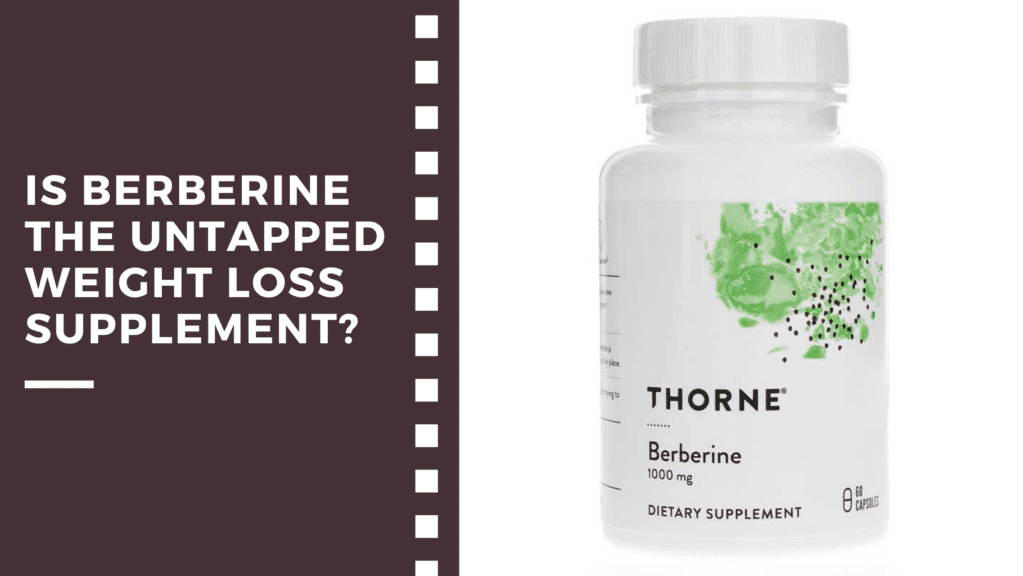
Berberine is the latest dietary supplement to garner attention from the masses due to its potential impact on weight loss. Berberine is a naturally occurring supplement found in the bark, roots, and stems of various plants.
It is a supplement that has been around for a long time, but has recently been popularized by the likes of Andrew Huberman. It seems that every year there is a new weight loss supplement that gains popularity. I remember working in a supplement store when Garcinia cambogia was flying off the shelves.
Every fat loss supplement has a different mechanism to help you lose weight. Some have a thermogenic effect that raises metabolism. Others serve as an appetite suppressant, making it easier to maintain a calorie deficit.
Berberine works primarily due to its effect on glucose and insulin. It’s traditionally used by type-2 diabetics, who have poor insulin sensitivity and thus do not utilize glucose as efficiently as non-diabetics would. Elevated glucose in the blood can lead to a number of health problems.
All of this sounds great on paper. Who wouldn’t want to improve insulin sensitivity? It’s something that even people like bodybuilders strive for. Improved insulin sensitivity not only means less fat storage, but improved muscle growth.
However, this is a trap many people fall into when looking at research. You can’t necessarily extrapolate data from diabetics and assume it translates to healthy individuals. Diabetes is a chronic health condition which changes your physiology. A type-2 diabetic does not operate the way a healthy person would.
We’ll look at the mechanisms and research surrounding Berberine and discuss if it potentially applies to the general population for fat loss.
How Berberine Works For Weight Loss
The most promising aspect of Berberine is that it seems to work in a variety of ways.
Berberine helps users lose weight by increasing AMP-kinase (AMPK). AMPK has been discussed extensively in this blog, particularly when discussing how to balance cardio with weightlifting.
AMPK signals the body to break down nutrients like carbohydrates and fats for energy. This is why it is elevated during cardiovascular exercise, when the demand for energy is high.
One study showed that Berberine can increase brown adipose tissue, or “brown fat” [1]. Brown fat is more metabolically active than white fat. When you hear of people using ice baths or cold showers for fat loss, it is partially due to this (proposed) conversion from white to brown fat.
Another potential weight loss mechanism is its effect on the gut microbiota [2]. I tend to be apprehensive when it comes to the gut since there is so much we don’t know. But Berberine is technically a fiber (remember it comes from tree bark and plants), so this effect makes sense.
When you combine these three mechanisms with Berberine’s influence on insulin and glucose, you have multiple paths to weight loss. As a result, Berberine can be considered an overlooked and potentially effective weight loss supplement.
When you think of common weight loss ingredients found in a fat burner supplement, you usually think of caffeine, carnitine, synephrine, green tea,
With that said, there is always a drawback. When you take something to cause a reaction in the body, it will respond to maintain homeostasis.
Why People Using Berberine Should Take Caution
Berberine has traditionally been used by diabetics for glucose control and insulin sensitivity. It seems to work so well that its effects rival even those of pharmaceutical drugs.
While this may sound great, healthy users should take caution. Type-2 diabetes is a serious illness. If Berberine is as effective as the research suggests, it could have a dramatic and potentially dangerous impact on a healthy person of normal weight. If your blood sugar drops too low it could lead to dizziness or fainting.
Berberine is certainly a supplement you want to test at a low dosage. While the standard serving size for supplements is 1,000-1,200mg, I like supplements that come in 500mg pills. This allows you to experiment at a low dose.
Another common side effect is gastrointestinal distress. As mentioned, Berberine is a fiber and can impact the gut. Experiment with Berberine the same way you would with a fiber supplement or probiotic.

Can Berberine Block Muscle Gains
The idea of Berberine blocking muscle gains may sound counterintuitive, after touting the importance of insulin sensitivity when it comes to building muscle.
However, it’s important to note the interaction between AMPK and muscle growth. As mentioned, Berberine can increase AMPK. AMPK can have a negative impact on another signaling molecule called mTOR.
In simple terms, AMPK sends a signal to break down while mTOR sends a signal to build up. When it comes to the subject of muscle growth, AMPK is something to avoid since it blocks this all important signal. It is why bodybuilders are encouraged to do their cardiovascular work as far away from their resistance training as possible.
If you’re looking to pack on as much muscle as possible, it would probably be a good idea to avoid Berberine. Although if that was your goal, you’re likely eating in a calorie surplus with no consideration for fat loss anyway. Any intermediate or advanced trainee knows that you cannot optimally build muscle and burn fat at the same time.
Conclusion
Berberine is often overlooked as a weight loss supplement since the average consumer is likely unaware of its effects. Berberine has a potent effect on lowering blood glucose, which is why it should be used with caution to avoid hypoglycemia.
If used responsibly, it may be beneficial for fat loss via a number of mechanisms. While most fat burners have one pathway toward weight loss, Berberine has many. Still, it should be used cautiously and at a low dose to start.
References
